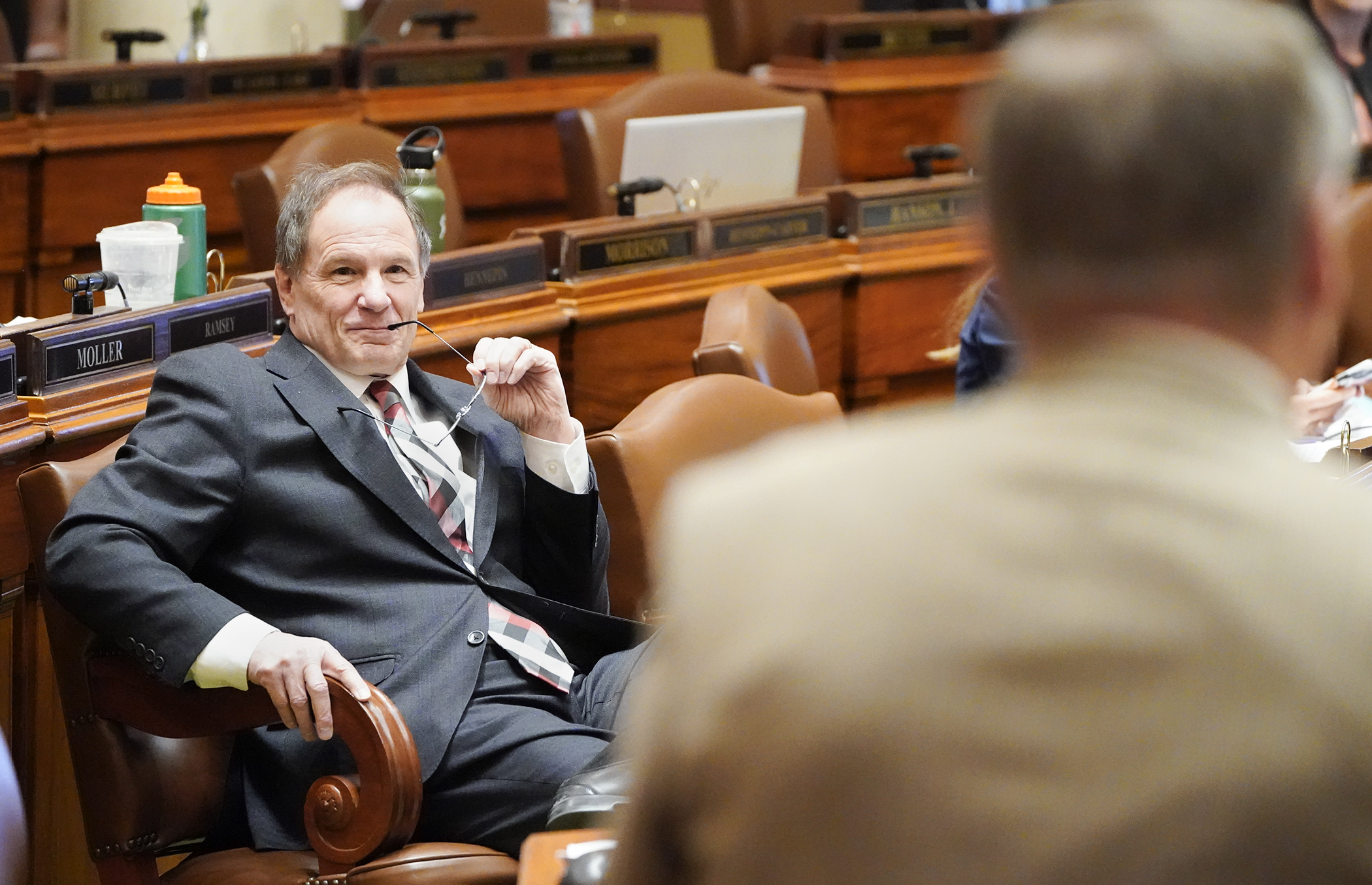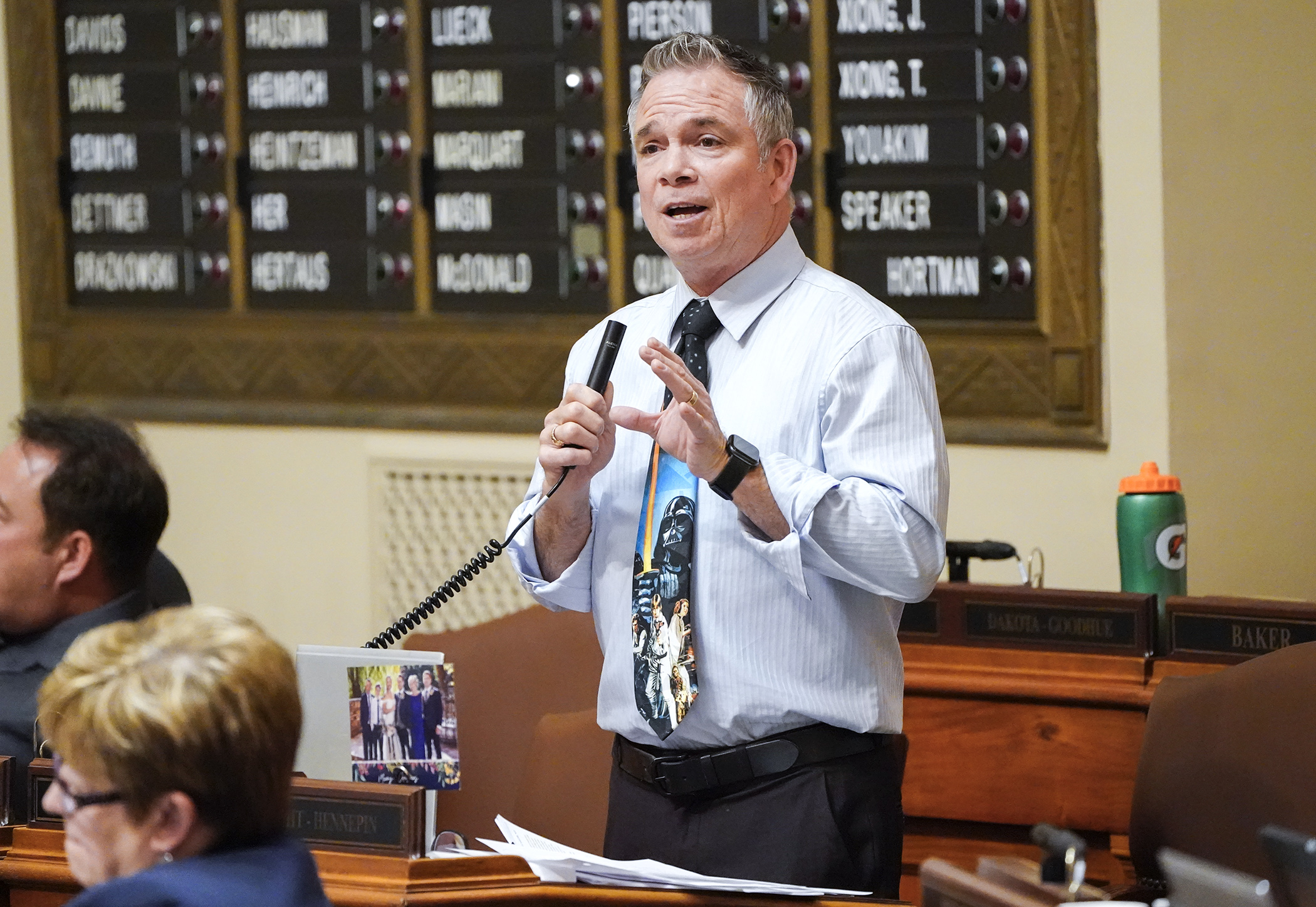House passes omnibus tax bill; battle over cuts, credits now heads to Senate

To supporters, the House omnibus tax bill looks like the largest tax cut the state has offered residents in decades. To detractors, it doesn’t cut taxes nearly enough.
Yet, after four-and-a-half hours of debate Wednesday, the bill passed by a 69-62 party-line vote, and is on its way to the Senate.
Sponsored by Rep. Paul Marquart (DFL-Dilworth), HF3669, as amended, would result in $1.65 billion in tax reductions and credits in the 2022-23 biennium and $1.6 billion in the next biennium, according to the Department of Revenue.
Marquart emphasized how provisions in the bill would reduce the tax burdens of families with young children and senior citizens, whether homeowners or renters.
“It is a strong bipartisan bill that will provide the largest property tax cut in over 20 years for homeowners and renters,” Marquart said. “And it will make a meaningful impact on our families and seniors, and help those who were affected most by the pandemic.
“The premise is very Minnesotan. … If you see your neighbor has a challenge, you go over and ask how you can do the most good. This bill looks at: How can we help?”
Marquart said that help would come in the form of a $3,000 child care tax credit for each child under age 5, an increased student loan tax credit, and a rebate of $325 for each child age 16 and under.
The Senate tax bill, SF3692, sponsored by Sen. Carla Nelson (R-Rochester), contains only two principal provisions, as opposed to the dozens in the House bill. Passed by the Senate on April 7, SF3692 would exempt all Social Security benefits from taxation and reduce the first-tier income tax rate from 5.35% to 2.80%.
The House bill leaves the current income tax tiers as they are, but modifies taxes on Social Security benefits.
“For senior citizens, we’re saying that Social Security benefits, as a married joint filer, if your income is $75,000 or less, you won’t pay a dime in Social Security taxes,” Marquart said. “If you’re single, that income level would be $59,000 or less. This provision would get out to about a quarter of a million seniors at an average reduction of $470.
“But we also help seniors with maintaining their independence, and making sure that they have quality health care into the future. We do that with some significant property tax cuts.”
The most significant of those cuts would come from an expansion of the renter’s credit, which would become a refundable credit payable on the same schedule as other income tax refunds. Its $372.6 million impact on the state’s General Fund in fiscal year 2023 would be the largest in the bill.
While praise for Marquart – who will retire at the end of this term – was widespread on both sides of the aisle during the floor debate, some Republicans said that the bill doesn’t go far enough in its cuts in Social Security taxes and are concerned business and individual income taxes in the state remain too high.
 Rep. Joe McDonald speaks against the omnibus tax bill during floor debate May 4. (Photo by Paul Battaglia)
Rep. Joe McDonald speaks against the omnibus tax bill during floor debate May 4. (Photo by Paul Battaglia)DFL members countered by hailing the “Great Start” child care tax credit and the rebate for each child age 16 and under, as well as a change in the formula for local government aid and county program aid. Members from both parties praised the bill’s dedicated funding for the state’s soil and water conservation districts.
Two amendments were proposed.
Approved by the body was a Marquart amendment that would remove the sunset date on a tax exemption for energy storage systems and clarify some duties of the tax expenditure review commission that was launched this year. Defeated was one offered by Rep. Cal Bahr (R-East Bethel) that would have transferred $484,650 of Minneapolis’ local government aid to the county program aid for Anoka County.
The latter issue is centered upon the total still evidently being owed to Anoka County for its law enforcement and other services rendered in the aftermath of the death of George Floyd at the hands of a Minneapolis police officer. The proposed amendment sparked a 90-minute debate that primarily centered upon mutual aid between city and county agencies.
Among other proposed cuts, credits and new aid programs in the bill are:
- an unemployment insurance subtraction with a maximum of $10,200;
- a sales tax exemption for construction materials for local governments and nonprofits;
- grants to counties for pandemic business aid;
- grants to counties for community career workforce academies;
- an extension of the historic structure rehabilitation tax credit;
- grants to counties for pandemic rental assistance; and
- a rebate to municipal utilities that raised rates because of the 2021 polar vortex.
[MORE: A list of the bills included in the House omnibus tax bill]
“I thought we were going to boldly go where no man or woman had gone before,” said Rep. Jerry Hertaus (R-Greenfield). “But I think the Klingons got in the way. … This bill is unbalanced because less than 10% of this bill deals with businesses, which employ people and provide opportunities. … The expanded renter’s credit isn’t tax relief, it’s growing another program. It’s a subsidy that encourages renting over owning.”
“This bill will make a huge difference,” Marquart replied. “This bill says to our families and senior citizens, we have your back. But we’re going to need another $200,000 if this bill becomes law for all those billboards that are going to go up in North Dakota, South Dakota, Iowa and Wisconsin that are going to say, ‘Working families and seniors: For lower taxes and great services, come to Minnesota!’”
Related Articles
Search Session Daily
Advanced Search OptionsPriority Dailies
Ways and Means Committee OKs proposed $512 million supplemental budget on party-line vote
By Mike Cook Meeting more needs or fiscal irresponsibility is one way to sum up the differences among the two parties on a supplemental spending package a year after a $72 billion state budg...
Meeting more needs or fiscal irresponsibility is one way to sum up the differences among the two parties on a supplemental spending package a year after a $72 billion state budg...
Minnesota’s projected budget surplus balloons to $3.7 billion, but fiscal pressure still looms
By Rob Hubbard Just as Minnesota has experienced a warmer winter than usual, so has the state’s budget outlook warmed over the past few months.
On Thursday, Minnesota Management and Budget...
Just as Minnesota has experienced a warmer winter than usual, so has the state’s budget outlook warmed over the past few months.
On Thursday, Minnesota Management and Budget...